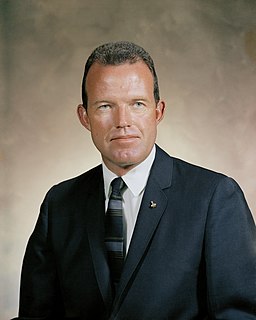A Quote by Hans Magnus Enzensberger
The reality in which a camera turns up is always posed, e.g., the moon landing.
Related Quotes
Dutch beaches were known to me as man-made territories, as part of various land reclamation projects. But I was also interested in the media reality of the Moon landing. I wanted to use that event as a measure of time, to see what had happened in those thirty years - which happens to be my lifetime as well. I was born in 1967 and I remember seeing the Moon landing on TV when I was two. All those things were in play. Then it became a big production. It took five months to gather up the goodwill and make it happen.
My take on what happened with the moon landing was [......] they suspect [ sic ] that on impact that the cameras would be damaged because back in 1969 cameras weren't, you know, like they are today, as good. So they had a studio set up at CBS to mimic the moon landing. And sure enough the cameras broke and so they flipped, you know, the CBS studio on. And what you saw of the footage of the '69 moon landing was actually at CBS studio.
The exciting part for me, as a pilot, was the landing on the moon. That was the time that we had achieved the national goal of putting Americans on the moon. The landing approach was, by far, the most difficult and challenging part of the flight. Walking on the lunar surface was very interesting, but it was something we looked on as reasonably safe and predictable. So the feeling of elation accompanied the landing rather than the walking.
While working with a camera crew supervising flight testing of advanced aircraft at Edward's Air Force Base, California, the camera crew filmed the landing of a strange disc object that flew in over their heads and landed on a dry lake nearby. A camera crewman approached the saucer, it rose up above the area and flew off at a speed faster than any known aircraft.
Guess what it is that turns plants to coal. Pressure. Guess what it is that turns limestone to marble. Pressure. Guess what it is that turns Briony's heart to stone. Pressure. Pressure is uncomfortable, but so are the gallows. Keep your secrets, wolfgirl. Dance your fists with Eldric's, snatch lightning from the gods. Howl at the moon, at the blood-red moon. Let your mouth be a cavern of stars.
To send humans back to the moon would not be advancing. It would be more than 50 years after the first moon landing when we got there, and we'd probably be welcomed by the Chinese. But we should return to the moon without astronauts and build, with robots, an international lunar base, so that we know how to build a base on Mars robotically.
If we go back to the moon, we're guaranteed second, maybe third place because while we are spending all that money, Russia has its eye on Mars. Landing people on the moon will be terribly consuming of resources we don't have. It sounds great - 'Let's go back. This time we're going to stay.' I don't know why you would want to stay on the moon.
For me, what was important was to record everything I saw around me, and to do this as methodically as possible. In these circumstances a good photograph is a picture that comes as close as possible to reality. But the camera never manages to record what your eyes see, or what you feel at the moment. The camera always creates a new reality.


































